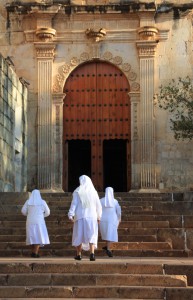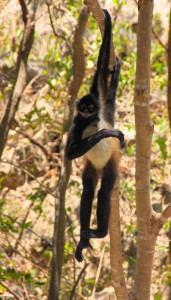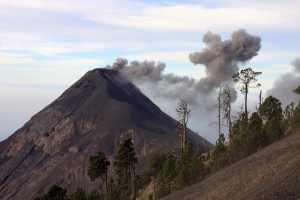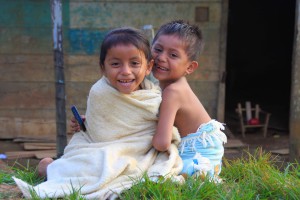My first impression of Guatemala was a good one. It is a beautiful country; it is mountainous, with terraced hills, numerous looming volcanoes, and diverse forests. Traffic is busy and chaotic, people are everywhere and food stalls; notably fruit, line the roadside. Churches stand tall in every town, Catholicism being the main religion here. And of course, a town is not complete without a football field, even if it does consist of a dirt patch with makeshift goals at times. I was looking forward to getting out the small football I carry with me everywhere when I travel.
I soon became introduced to the reality of Guatemalan roads; a supposedly nine-hour trip took fourteen hours after a demonstration closed the main road, forcing the bus to take a back road. As if nine hours wasn’t long enough for what was only a 400km journey. That same journey encountered narrow cobbled city streets, a minor accident with another car requiring negotiation, and a small payout to repay the damage, and then after an already long day, another road blockage. This time, roadworks, with a predicted 1.5-2 hour waiting time. Once traffic finally got moving, the bus was unable to, requiring passengers to pile out and help push the bus along again. It was an exhausting first day in Guatemala, but one that was highly rewarding; an authentic and realistic impression of this country. I knew I was in for a treat.

I spent the first week of my elective making my way towards the medical center in rural Guatemala, a destination not easily reached. Transport in Guatemala consists of “chicken buses”, a journey I am quite fond of, but something many people dread. If you’re after a smooth journey and perhaps a short nap, the chicken bus isn’t for you. However, despite its discomfort and danger, public transport here is remarkably effective. I have never had difficulty finding the bus I need; with numerous helpful and friendly locals, alongside the persistent yelling of the bus driver, there is no mistaking the direction you need to go. It is only when you start swinging around the corners at full speed along some narrow winding mountain roads, and you notice the sign above the drivers that says ‘adicto a peligro’ (addicted to danger) that you begin to question your willingness to survive the next few months.
This opportunity to see a bit of Guatemala on route to the medical center was a real privilege and a great way to gain perspective of the country I will be in for the next few months. Seeing Volcan Feugo erupt at night (an eruption last year in June killed 2500 people which left much of the road and village devastated) from the top of Volcan Acatenango under a starry sky, has to be one of the most incredible things I have ever seen, and yet the most memorable and important memories so far have been interactions with locals.
Transitioning from locations that fall on a tourist route, where foreigners are plentiful and local interactions are few, and moving progressively more rural until I finally became immersed into an indigenous community; the contrast was marked. I became more aware of the reason I love traveling; that is, the people. Traveling as a backpacker has made me truly respect and value the experience of living in a community. I can appreciate the real privilege we have been given as medical personnel, to enter into and be accepted into a community because of the skills we have. And it is opportunities like these, I travel for. Opportunities to get to know the people, to learn their culture, daily routines, perspectives and understand the unique challenges faced in their society.
I am already beginning to notice real health needs. I am becoming aware of the existence of the ‘double burden’ of disease. The coexisting burden of malnutrition and infectious disease, with an emerging burden of chronic disease as obesity and heart disease have become more common with the influence of western society. Poor dental health is particularly noticeable, and hardly surprising considering the cheap and easy access to sugary food.
I know I won’t be able to make a huge difference in my time here but becoming involved in an indigenous culture that lacks so many of the basic needs we take for granted, will be rewarding and challenging.




No comments yet.
Leave a comment